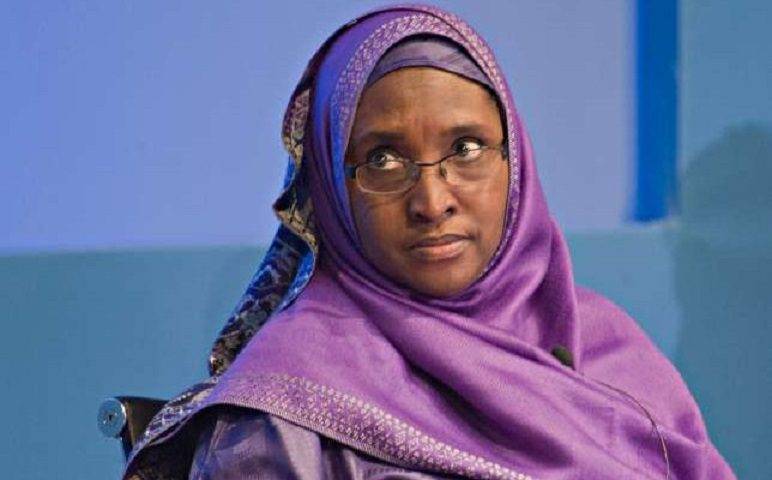Gov’t Increases VAT To 7.2% Same Day Tribunal Okays 2019 Election Victory – And Nigerians Are Pissed!

Nigeria’s VAT is going to be reviewed upwards.
When Zainab Ahmed, Nigeria’s Minister for Finance, Budget & National Planning, addressed the weekly Federal Executive Council (FEC) meeting yesterday, she did drop something of a shocking announcement.
Per the words of the minister, it can be deduced that the Nigerian government wants to get its hands on more funds and everyone’s going to have to pay for it.
During the FEC session, the Finance Minister made it known that the Nigerian government has approved a 2.2 percent increase in Value Added Tax (VAT).

Source: von.gov.ng
This means that, pending formal approval by the National Assembly, the new VAT rate will now be 7.2 percent, up from 5 percent. She said the increase was intended to expand fiscal revenue in the country — funds that will go into the state and local governments.
“This is important because the federal government only retains 15 percent of the VAT, 85 percent is actually for the states and local government and the state need additional revenue to be able to meet the obligations of the minimum wage,” the Minister said.
“This process involves extensive consultations that need to be made across the country at various levels and also it will involve the review of the VAT Act. So, it is not going to be implemented immediately until the Act is reviewed,” she added.
What A VAT Increase Would Mean For The Average Nigerian
Simply put, a VAT increase would lead to an increase in the price of products and services. Essentially, it could cause full-blown inflation.
In Nigeria, Value Added Tax (VAT) is payable on all kinds of goods and services consumed by any person, whether government agencies, business organisation or individuals.
By law, only medical and pharmaceutical raw materials and products, basic food items, baby products, commercial vehicles and spare parts, fertiliser, diplomatic goods, and a few other products are excluded from the VAT net.
Usually, businesses include VAT in the final cost of products and/or services they render. This means it is the customer or end-user that gets to pay for it. And increased VAT would imply higher bills for customers to pay since it’s hard to envisage a decrease in production costs.
Essentially, here’s what the new VAT regime might bring about:
- Increase in inflation rate as the price of goods and services not exempted from VAT is bound to increase.
- Increased government revenue for various infrastructural and economic projects.
- Hardship for workers whose purchasing power would be hurt by the hike in costs if their paychecks remain the same.
- Market operations in the informal sector may take a significant hit as price hikes would discourage consumption. Business activities may ultimately slow down.
How Are Nigerians Reacting To The Newly Proposed VAT Regime?
The proposed VAT hike has caused an outcry on social media, especially Twitter where many agitated Nigerians are questioning the decision of the government.
See some of the reactions below:
Most Nigerians are silent on this VAT to 7.2% hike cos they are ignorant of the consequences. Here’re a few takes:
*Prices of foodstuffs will shoot up
*Naira value will further reduce
*More money will be available for politicians to loot
*More poverty & miseries#Buhari #Atiku pic.twitter.com/kiYUsHiLuD— Afri-Sagacity (@afrisagacity) September 12, 2019
Buhari wants to increase VAT to 7.2 in order yo increase FG revenue to fund budget. Here’s an idea. Invest in the tourism economy, fix security and electricity. Watch tourism tax and FDI give us in 10 years what 20% VAT sef will not give us in 50.
It is not rocket science.
— Dr Oluniyi Gates M.D. J.D. Ph.D. (@OluniyiGates) September 12, 2019
We can resist “VAT to 7.2%” the way we resisted “RUGA” and “Border Closure on Food Importation”.
This development by the @FinMinNigeria and @MBuhari‘s FEC is not the next right thing for #Nigeria.— John Ifebunandu (@JohnIfebunandu) September 12, 2019
Nigeria 2019: Vat to 7.2%
Tunisia 2018: from 20% to 7%Ghana in 2017: from 17.5% to 3%
Egypt 2019: Proposed reduction to 5%All over the world economies are cutting down VAT to stimulate economic growth. But the Nigerian govt is doing the opposite because it has no ideas.
— Young Otutu (@YoungOtutu) September 12, 2019
Nigerian politicians are really the wickedest people on earth…
If you know about commodities, you can feel the noose tightening around the neck of the common man.
Increasing VAT to 7.2% while Senators are getting billions monthly and refusing to increase minimum wage is wow!
— the Morris Monye factor (@Morris_Monye) September 12, 2019
FGN hiked VAT to 7.2% on the very day they got a favourable ruling from PEPT. A curious coincidence! We’re beginning to reap the dividend of our electoral decision of 23/2/2019.
— John Danfulani (@john_danfulani) September 12, 2019
Don’t be fooled by what any politician is tweeting.
Nobody is going to stop Buhari from implementing this plan in 2020.
Niggas watched as Buhari turned the Judiciary to his trash can.
You think they will stop Buhari from increasing vat to 7.2%?
— William Ukpe (@William_Ukpe) September 12, 2019
It takes less than 3 months to increase VAT, but years of negotiating 30k minimum wage …
Nonsense set of people. ?
VAT to 7.2%.#Nigeria— musty barde (@BardeMusty) September 12, 2019
Nig with none of the basic amenities & no incentives for SME ar increasing VAT to 7.2% as if it isn’t enough that for a business to thrive in Nigeria, the business owner, must provide all the amenities he needs for himself.
I say no to increment of VAT to 7.2% #pointofview pic.twitter.com/YkM4MRy0pG
— Pecky (@PeckyOfficial) September 12, 2019
Featured Image Courtesy: guardian.ng